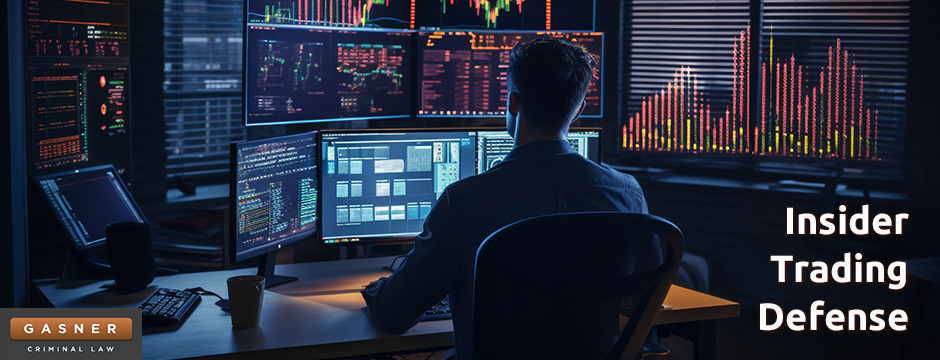Insider Trading Attorney
When does a stock tip become insider trading? Typically, it’s when the tipper has inside information that is not yet publicly available. Every quarter, publicly listed corporations must report how the company performed in the quarter before. That is considered privileged and highly confidential information. If someone performs an equity trade after a public disclosure, that is considered a fair trade. But if the seller acted on the information before it became public – such as amassing a large position before a material announcement – that could result in a charge of insider trading. A former top Apple lawyer, for example, pled guilty to insider trading for ignoring the quarterly "blackout periods" that barred trading before Apple's results were released.
The Government Contacted Me. Should I Contact an Insider Trading Attorney Now?
If you receive a phone call or visit from an attorney who works for the SEC, the attorney will ask specific questions about your recent trades immediately before the material announcement. First, answering any questions is strictly voluntary, a right guaranteed by the fifth amendment – nor shall be compelled in any criminal case to be a witness against himself – and buttressed by the fourth amendment:
The right of the people to be secure in their persons, houses, papers, and effects, against unreasonable searches and seizures, shall not be violated, and no Warrants shall issue, but upon probable cause, supported by Oath or affirmation, and particularly describing the place to be searched, and the persons or things to be seized.
It is almost always wiser not to answer any questions until you have first consulted with your defense attorney. Government investigators are trained to elicit a damning statement that you might let slip. Adam Gasner recommends that you politely decline to answer on your own. Resist being intimidated, because SEC attorneys must reschedule the interview to a later date when your lawyer can be present. How far ahead? More on that further down.
I’ve Been Charged. What Penalties Do I Face?
Insider trading charges carry both criminal and civil repercussions. Often one may face dual cases filed by both the U.S. Attorney’s Office and the Securities and Exchange Commission (SEC). This can be a difficult balancing act both for you and your attorney.
Criminal penalties include hefty fines and jail sentences if convicted for the criminal charges, and the civil charges may prevent you from serving within the executive ranks of a publicly traded company. “The maximum prison sentence for an insider trading violation is now 20 years. The maximum criminal fine for individuals is now $5,000,000, and the maximum fine for non-natural persons (such as an entity whose securities are publicly traded) is now $25,000,000. Civil Sanctions.” With the global internet and a constant stream of financial data through our mobile devices, it’s arguable that any legitimate financial research could be mischaracterized as insider trading. Whether it’s Yahoo Finance, Bloomberg, CNBC, or The Wall Street Journal, it’s amazing what information and data you can access for relatively cheap monthly subscriptions. And yet, despite the prevalence of data, the SEC seems more determined to go after alleged instances of insider trading.
It would be wise to acquaint yourself with a skilled attorney so that in the unfortunate instance of facing multiple charges, you have a leg up on your defense. Not all insider trading is illegal, but Adam Gasner can help you evaluate each detail of your case and craft the best defense possible. He will assess your actions, motivations, and foreknowledge of financial information. He will also request a copy of the formal order from the SEC to be delivered before your follow-up questioning date.
What Are Common Cases Involving Unlawful Insider Trading in the San Francisco Bay Area?
In the San Francisco Bay Area and Silicon Valley to the south, there are many successful publicly traded companies, exactly the hunting ground that the SEC and the Feds love to prowl. They target C-suite employees who allegedly trade in confidential information. They pry into the personal affairs of friends and family members of those employees who might have picked up a tip from a company board meeting. Company vendors might come across a valuable tidbit after glancing at a white paper. Leaks are rampant and sources hard to pinpoint.
Questions to Ask Your Cyber Crimes Attorney
Defending an insider trading case takes experience, resourcefulness, and a thorough knowledge of Federal Securities Law. Your defense attorney should have a background in working on insider trading cases and with the acumen to create a bulletproof defense – or at least something close to it if the evidence seems particularly damning. To help inform your decision and ensure that you will be receiving adequate representation, ask your lawyer these questions:
- Do you have experience defending a client who has been charged with insider trading?
- Are you familiar with the case law in our jurisdiction?
- Have you taken an insider trading case to trial?
- What are potential defense strategies for insider trading?
- Have you had success in the past getting insider trading charges dropped?
How Gasner Law Can Help
If you have been contacted by law enforcement for insider trading, look for the right San Francisco defense attorney and do so quickly. Even the ideal insider trading legal team needs sufficient time to develop a water-tight defense. How long? It depends on the charges and the evidence. Gasner Law has the expertise required to see you through your insider trading charges and will make a thorough analysis of the government's case. Call Gasner Law today at 415-782-6000.

